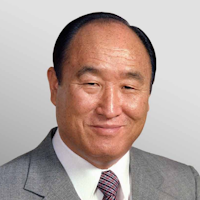World peace can be fully accomplished only when the wisdom and efforts of the world’s religious leaders, who represent the internal concerns of the mind and conscience, work cooperatively and respectfully with national leaders who have much practical wisdom and worldly experience…
World peace can be fully accomplished only when the wisdom and efforts of the world’s religious leaders, who represent the internal concerns of the mind and conscience, work cooperatively and respectfully with national leaders who have much practical wisdom and worldly experience…
Sun Myung Moon

The Religious Leaders of the World
Topic: Justice, Vision, & Leadership
“World peace can be fully accomplished only when the wisdom and efforts of the world’s religious leaders, who represent the internal concerns of the mind and conscience, work cooperatively and respectfully with national leaders who have much practical wisdom and worldly experience about the external reality, or “body.” In this light, it is time for us to give serious consideration even to the prospect of restructuring the United Nations. For example, perhaps it is possible to envision the United Nations as a bicameral institution.
The existing United Nations structure, composed of national representatives, may be regarded as a congress where the interests of each member nation are represented. However, I submit that serious consideration should be given to forming a religious assembly, or council of religious representatives within the structure of the United Nations. This assembly or council would consist of respected spiritual leaders in fields such as religion, culture and education. Of course, the members of this interreligious assembly will need to have demonstrated an ability to transcend the limited interests of individual nations and to speak for the concerns of the entire world and humanity at large.
The two chambers, working together in mutual respect and cooperation, will be able to make great advances in ushering in a world of peace. The wisdom and vision of great religious leaders will substantially supplement the political insight, experience and skill of the world’s political leaders.”
Sun Myung Moon (born January 6, 1920, in Jeongju, in what is now North Korea – died September 3, 2012, in Gapyeong, South Korea) was a Korean religious leader, entrepreneur, and founder of the Unification movement. Raised in a rural Confucian-Christian household during the Japanese occupation of Korea, Moon’s early life was shaped by hardship, devotion, and a strong sense of spiritual calling. As a teenager, he experienced a profound vision in which he believed Jesus commissioned him to complete the work of restoring humanity to unity with God. This revelation became the foundation of his lifelong ministry, devoted to the ideal of universal peace and the healing of the relationship between the divine and human families.
In 1954, after enduring persecution and periods of imprisonment under both Japanese and communist authorities, Moon founded the Holy Spirit Association for the Unification of World Christianity in Seoul. His teachings—later presented systematically in the Exposition of the Divine Principle—offered a reinterpretation of Christian theology emphasizing God’s parental love, human responsibility, and the sanctity of marriage and family. Central to his vision was the belief that love is the creative force of the universe and that humanity’s purpose is to build a world reflecting the oneness of God’s heart. Through international missions, interfaith dialogue, and mass wedding ceremonies symbolizing global reconciliation, Moon sought to transcend divisions of race, religion, and nationality.
Beyond his religious work, Moon established numerous organizations in education, media, culture, and humanitarian service, aiming to foster dialogue, moral renewal, and peace. He and his wife, Hak Ja Han Moon, were regarded by followers as the “True Parents,” embodying the ideal of restored unity between men and women, heaven and earth. While his movement inspired both devoted commitment and significant controversy, Moon’s influence on global religion, culture, and peace initiatives remains substantial. His life reflected an unwavering pursuit of the vision of one human family under God—a vision he advanced with conviction, discipline, and enduring faith in the transformative power of divine love.
Universal Peace Federation
Wilson, Andrew, editor. World Scripture II. Universal Peace Federation, 2011, pp. 1100-01 [Sun Myung Moon (August 18, 2000)].

Sun Myung Moon
Resources
- Headwing Philosophy and the Law of Nations (Journal of Unification Studies)
- The Inter-religious Council at the United Nations: Universal Peace Federation's Founding Vision
- Universal Peace Federation: A global network of peacebuilders
- In Praise of the Rev. Sun Myung Moon Dr. Richard L. Rubenstein
- He Helped to Make Me a Better Human Being Dr. Morton A. Kaplan Distinguished Service Professor in Political Science, Emeritus, The University of Chicago
- Dr. Nicholas N. Kittrie, KtSJ Chairman, Eleanor Roosevelt Institute for Justice and Peace, Washington, D.C.
- Cheon Seong Book 10, The Philosophy of Peace: Godible Episode 322,
Copyright © 2017 – 2026 LuminaryQuotes.com About Us

A Religious Council at the United Nations
Reverend Moon’s proposal to establish a religious council at the United Nations would create a check on the vested interests of the leaders of the nation-states that currently constitute it. Such a religious council would be more aware of those who are marginalized and help insure that that any UN action considers their well being. If the United Nations could not be reformed along these lines, some other institution would need to arise to accomplish this purpose. If the United Nations fails to reform, those who understand the importance of headwing ideology should be in the vanguard to bring such an international institution into existence.
–Gordon L. Anderson [Headwing Philosophy and the Law of Nations (Journal of Unification Studies Vol. 6, 2004-2005)] pp. 85-96
Universal Peace Federation
Universal Peace Federation (UPF) is an NGO in Special Consultative Status with the Economic and Social Council of the United Nations. Other UPF programs include: Interfaith; peace and security; marriage and family; peace education; youth and service.
The United Nations and World Peace
(1) After the First World War, expectations were high that a world of peace would emerge, a world free from war, based on the League of Nations. But less than three decades later, war broke out again. Nevertheless, people’s innate inclination to pursue peace remained unchanged. We desire to advance toward a world of peace, even if we have to die for it. That is why, after the Second World War, the League of Nations was dissolved and the United Nations was founded. In the belief that all people are brothers and sisters, we entered an era when the victorious nations gave the defeated nations their independence and protected and nurtured them in the name of brotherhood. Now, the military conflicts that arose during the Cold War have come to an end. The Third World War has been an ideological war. The Soviet Union and the United States are both reluctant to fight. Now, whether they like it or not, we must proclaim for the sake of peace, “God exists!” and explain what the world should be like. Unless we do so, there is no way for the world to be brought under God’s dominion. Because I understood this, I presented a worldview and a universal teaching based on the absolute values of God, and I systemized a principle by which we can liberate even God Himself.
The renewal of the United Nations and world peace
(2) Now we need to create the model for a nation of peace. We are working to bring world peace through unity at the United Nations. We need to help the United Nations stand in the position to lead all the nations of the world. I included the word “peace” in the names of numerous organizations that I founded, including the Inter-Religious Federation for World Peace, the Federation for World Peace, and the Professors World Peace Academy. This is because I have set my sights on the United Nations. I have been preparing for this for decades. Originally the United Nations was meant to set the standard that nations should follow. It was meant to lead the way to peace for humankind.
(3) For a world that is comprised of individual nations to become a world of peace is not something that can be done overnight. It requires a long period of time. In order to transform something, we need a model. If there were a model nation such that people would say, “Wow, when we follow that, our nation will develop!” and if the environment were such that the United Nations could promote it and every nation could support it, all nations would be bound to follow it. That is why the work I am doing now is welcomed by the developing nations. There are only a small number of advanced nations—the G7, or the G8. Apart from them, many other nations are developing. If the United Nations were to uphold one model as a nation of peace, then all UN member states would naturally turn in that single direction.
(4) The present United Nations cannot achieve world peace. Every nation is fighting for its own benefit. This is not correct; it is not conscientious. That is why a religious assembly, centered on the conscience, should be part of the United Nations. The Women’s Federation for World Peace is working behind the scenes. Providentially, women should play a central role in bringing about world peace; otherwise, people will continue to fight. Women need to form an organization that can stand at the center, embrace Cain and Abel, and create an atmosphere of peace throughout the world.
(5) Who should lead world peace? God should lead it. God should lead both the religious realm and the political realm. I am advocating a United Nations of the religious realm. Furthermore, I am advocating a Women’s UN. These two organizations must be created. This is how present-day humanity will be brought into alignment with God’s plan.
(6) Politics alone cannot change the world. We are dealing with the political arena, but it is extremely corrupt. Families in their current state are dysfunctional, and they cannot correct this. That is why we need religions to unite and rally the world on the right path, the shortest way to a world of peace.
–Sun Myung Moon [Cheon Seong Gyeong Book 10: The Philosophy of Peace, Section 3: The United Nations and World Peace (06)].